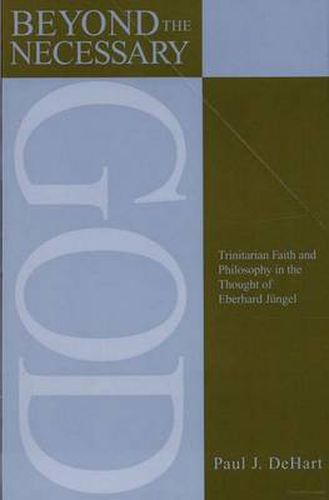Readings Newsletter
Become a Readings Member to make your shopping experience even easier.
Sign in or sign up for free!
You’re not far away from qualifying for FREE standard shipping within Australia
You’ve qualified for FREE standard shipping within Australia
The cart is loading…






Beyond the Necessary God examines the trinitarian thought of German theologian Eberhard Jungel. One of the most creative theologians working with the legacy of Karl Barth, Jungel combines the critical interaction of his doctrine with metaphysical traditions, philosophical anthropology, and reflection on language. In this accessibly written book, Paul DeHart offers an elegant introduction, exposition, and interpretation of the work of a theologian who is only beginning to be translated and understood in the English-speaking world. By carefully guiding the reader through Jungel’s assessment of crucial theological questions, DeHart makes a significant scholarly contribution and fills a gap in English-language scholarship on Jungel. In light of the death of the God of metaphysical theism, Eberhard Jungel creatively develops the theological concept of God-the God who comes to human speech-in a manner conversant with modern and post-modern traditions. Useful both to the theological scholar and the advanced student, Paul DeHart’s book is a careful and important exposition of Jungel’s theological contributions, with special attention given to his doctrine of God. -Paul E. Stroble
$9.00 standard shipping within Australia
FREE standard shipping within Australia for orders over $100.00
Express & International shipping calculated at checkout
Beyond the Necessary God examines the trinitarian thought of German theologian Eberhard Jungel. One of the most creative theologians working with the legacy of Karl Barth, Jungel combines the critical interaction of his doctrine with metaphysical traditions, philosophical anthropology, and reflection on language. In this accessibly written book, Paul DeHart offers an elegant introduction, exposition, and interpretation of the work of a theologian who is only beginning to be translated and understood in the English-speaking world. By carefully guiding the reader through Jungel’s assessment of crucial theological questions, DeHart makes a significant scholarly contribution and fills a gap in English-language scholarship on Jungel. In light of the death of the God of metaphysical theism, Eberhard Jungel creatively develops the theological concept of God-the God who comes to human speech-in a manner conversant with modern and post-modern traditions. Useful both to the theological scholar and the advanced student, Paul DeHart’s book is a careful and important exposition of Jungel’s theological contributions, with special attention given to his doctrine of God. -Paul E. Stroble